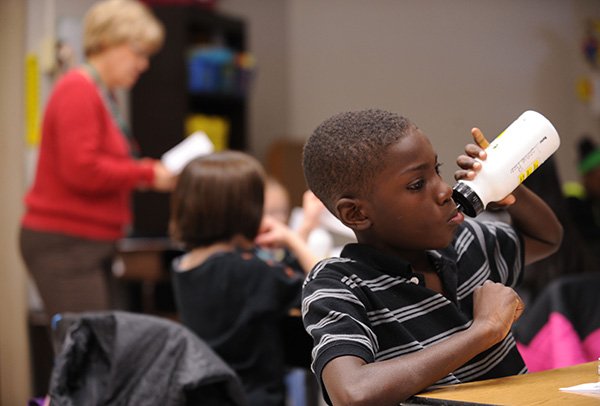FAYETTEVILLE — Students at Asbell Elementary School are learning how important drinking water throughout the day is to their education.
That’s the message coming from the Kendrick Fincher Hydration Foundation in a pilot program to help school districts bring hydration education into the classroom as part of Common Core State Standards instruction, said Rhonda Fincher, executive director of the foundation.
Fast Facts
Water
-75 percent of the body is made up of water.
-Water carries nutrients and oxygen to all cells in the body.
-Water helps convert food into energy and regulates body temperature.
-1 percent dehydration results in thirst.
-2 percent dehydration reduces your ability to work.
-4 percent dehydration results in lethargy, apathy and mental symptoms.
-Dehydration can cause irritability and headaches and hinder concentration.
Source: Kendrick Fincher Hydration Foundation
Hour by hour over two days last week, Kim Mason, a retired physical education teacher, went over age-appropriate material to help children learn about the importance of water and staying hydrated throughout the day.
They played games and sat on the floor in the Asbell gymnasium to hear Mason explain how each of them needed 50 to 60 ounces of water every day to stay hydrated. If they were active, such as participating in sports, or they were ill, they needed to drink more.
To reinforce the lessons, the Fincher foundation provided each student with a 20-ounce bottle to drink from throughout the day.
“There are water bottles everywhere,” said Tracy Bratton, principal.
Cheyanne Plunkett, the physical education teacher at Asbell, said the students are to fill the plastic bottles in the morning and keep the bottles on their desks.
Mason directed the children in active games, led a question and answer session, and used visual aids to get the message across.
As Mason poured cups of water from one container to another in a demonstration, one fourth-grade girl noted, “You’re pretty good not making a mess.”
Water is known to help concentration and memory, Mason told the students.
The pilot program includes meetings with teachers to explain the project and testing students to determine their level of understanding the importance of hydration before and after the class. Two follow-up conversations with teachers will be conducted, Mason said.
The lessons are divided by grade level, Fincher said.
Research shows that when a person is thirsty, he is 1 percent dehydrated. As a person becomes more dehydrated, there is a 10 percent loss in the ability to concentrate, Fincher said, adding some research states it may be closer to a 20 percent loss.
“There is such an emphasis on healthy meals in schools, but there isn’t enough emphasis on getting enough water during the school day,” Fincher said.
The foundation was formed in memory of Fincher’s son, Kendrick, who died in 1995 after experiencing heat stroke during football practice. The foundation’s mission is hydration education and prevention of heat illnesses.


